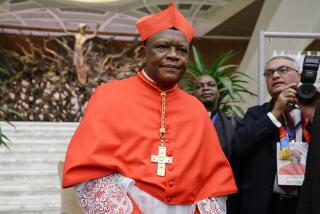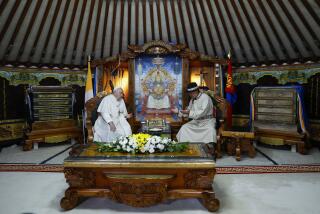Pope Assails Apartheid on Eve of Trip to Africa
- Share via
VATICAN CITY — Pope John Paul II, who begins his third pilgrimage to black Africa today, condemned apartheid in South Africa on Wednesday as “an inhuman situation” and said the Roman Catholic Church’s “repudiation of every form of racial discrimination is absolute and total.”
Speaking to thousands of tourists and pilgrims at a general audience in St. Peter’s Square, the pontiff lashed out against “the contempt for life and human rights” that prevails in some African countries. But, for one of the most anguished--Uganda, where the military recently overturned the government--he expressed hope that the people will gain “a real and lasting internal peace with the assurance that the rights and freedoms of the various ethnic and religious communities will be respected.”
The Pope’s 12-day, seven-nation tour will take him on a sweeping path across equatorial Africa from Togo and the Ivory Coast in the west to Kenya in the east with arduous inland journeys in between to Cameroon, the Central African Republic and Zaire.
Vatican officials said he is returning for the third time to the troubled continent because the church is experiencing its most rapid growth there, despite serious challenges from Islam and Protestant fundamentalism.
Muslim Youth Rally
In an unprecedented climax to what the Vatican calls “the second evangelization of Africa,” John Paul will address a rally of Muslim youths in Casablanca, Morocco, with King Hassan II, who claims direct descent from the Prophet Mohammed, at his side.
“It will be a gesture of peace and unity under one God with the Muslims,” said a Vatican clergyman.
“This is new in the history of the church for the religious leader of a Muslim country to ask the Pope to come, not to meet Catholics but to meet with Muslims,” said Vatican spokesman Joaquin Navarro-Valls.
He said the invitation came from Hassan, who had an audience with the Pope in 1980 and has since expressed admiration for the pontiff as “an educator of youth.”
John Paul’s religious mission in equatorial Africa will place heavy stress on the importance not only of continued growth in the numbers of Roman Catholic Church members, but also upon the “Africanization” of a religion that was historically identified with colonialism.
“The first evangelization was the conversion of Africans to Christianity,” Navarro-Valls said. “Now, with what he calls the second evangelization, the Pope will be telling the Africans that they cannot think any more about a missionary church--they are the missionaries now. Christian beliefs are not something alien or European or colonial; they are from the Gospels for all men.”
Although “Africanization” of the church has been sweeping in the last two decades--most of the bishops and many of the priests and nuns are now natives--local dioceses continue to face severe cultural and sectarian problems.
Polygamy, for example, is legal in most of the countries the pontiff will visit. Ancestor worship, traditional faith healing and spiritual elements of animism continually clash with prescribed forms of Roman Catholic worship.
In addition, some of the conflicts that beset church-state relations in more advanced countries also plague Africa. The government of Kenya, for example, has embarked on a radical birth control program, including the surgical sterilization of women, to curb its birthrate, one of the world’s highest, and the church has protested bitterly.
Northward Move
While the Pope will not be venturing into the famine-ridden Sahel region to the north, he is expected to urge African Catholics in the equatorial countries to move their missionary efforts northward, where Islam is making greater inroads than Christianity in converting largely animist populations.
Navarro said that the pontiff is eager to visit the famine areas, especially Sudan, but that since most of the Sahel countries are governed by Muslims, “They just don’t invite him.”
At present, there are about 16 million Roman Catholics in Africa, about 16% of the population, compared with a little over a million at the beginning of this century. With growth averaging 2 million a year, the Vatican expects 100 million followers by the year 2000. Islam claims 12% to 15% of Africans, according to Vatican estimates, and there are close to 100 million members of various Protestant sects, many of them home-grown offshoots of 19th- and early 20th-Century mission churches.
More to Read
Sign up for Essential California
The most important California stories and recommendations in your inbox every morning.
You may occasionally receive promotional content from the Los Angeles Times.













